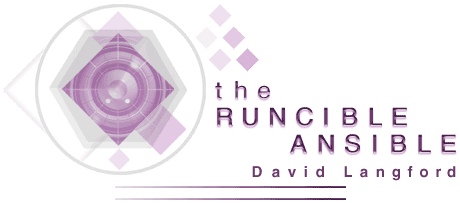
|
|
05.23.03 At another traditionally wine-sodden gathering in the Science Museum, London, on 17 May, the Arthur C. Clarke Award for best UK-published SF novel of 2002 went to Christopher Priest for The Separation. The Clarkean numerology that began with a £2001 prize in 2001 led by iron logic to this year's award figure of £2003. Chris was deeply moved and mentioned a key influence of long ago, Sir Arthur's The City and the Stars: 'That book changed my life.' Other authors from a particularly strong shortlist were present: M. John Harrison (Light), China Miéville (The Scar) and Elizabeth Moon (Speed of Dark). David Brin (Kil'n People, apostrophe added for UK publication) and Kim Stanley Robinson (The Years of Rice and Salt) couldn't make it. Miserably marketed by Simon & Schuster UK -- whose confession of ineptitude is quoted on the Priest website -- The Separation was hard to find even in British bookshops but has now been acquired in an unusual takeover move by Gollancz, with a first hardback edition scheduled for November 2003. Who knows, one day it might even appear in America? Our wonderful British press rarely takes interest in sf honours, but The Spectator for 17 May treated us to a gossip-column snippet calling the Clarke Award 'the Booker Prize of the science-fiction world' as preliminary to pouncing gleefully on the fact that one nominee, The Separation, is dedicated to ACCA administrator Paul Kincaid. Deflatingly for scandalmongers, it is not dedicated to the five judges who actually chose the winner. Science Corner. 'Mars is awash with radiation. That's why it's red.' (Brian Blessed on Richard and Judy, UK Channel 4 TV, 15 May) Justina Robson, already twice nominated for the Clarke Award, provides gossip-bait for The Spectator in her latest novel Natural History -- featuring a vast, lumbering, obsolete and not very bright terraforming engine, called Kincaid. Thog Conquers the World. Wearying of best-novel polls, the British newspaper The Independent invited literary notables to pick their choice of all-time worst novel. The 'winner', with three nominations, was The Lord of the Rings. Sir John Mortimer just loathes 'Anything about Gandalf, and those little things with hair between their toes. I hate that sort of portentous, phoney, medieval-magical way of writing.' Alain de Botton feels actively threatened by Tolkien: 'It's strange, weird and frightening, and makes me feel like I'm on the sidelines of a joke I don't understand.' Other excoriated fantasies were the Harry Potter saga, The Tempest and Jonathan Livingstone Seagull. J.G. Ballard put in a bad word for Finnegans Wake: 'Joyce's incomprehensible novel, which has provided a living for generations of English Literature professors, represents a lamentable tendency in 20th Century fiction: the quest for total obscurity. Finnegans Wake is the best example of modernism disappearing up its own fundament.' R.I.P. Robert Stack (1919-2003), US film actor best known for the TV The Untouchables, died on 14 May. He was 84. His sf roles were rare: he was a character voice in the dire animation Transformers: The Movie (1986) and also in Butt-Ugly Martians (TV, 2001). Terrifyingly, I am informed that his real name was Robert Langford Modini. Thog's Masterclass. Dept of 'Of Course SF Writers Aren't Novelists!' 'Contemporary novelists rarely write about science or technology. Margaret Atwood tackles both -- and more -- in one of the year's most surprising novels.' (The Economist, 3-9 May)
David Langford is an author and a gentleman. His newsletter, Ansible, is the essential SF-insider sourcebook of wit and incongruity. He lives in Reading, England with his wife Hazel, 25,000 books, and a few dozen Hugo awards. He continues to add books and Hugos. |
home | stories | columns | archive | faq |
Stories and articles © copyright 2001, 2002, 2003 by the original authors.
Illlustrations © copyright 2001, 2002, 2003, by the original illustrators.
Site graphics, logo, and html coding © copyright 2001, 2002, 2003, by Eileen K. Gunn.
All other material © copyright 2001, 2002, 2003, by Eileen K. Gunn.
All rights reserved.
Founding sponsor: Matrix.Net
